-
Title
-
The Little Apostle of the Mountain Province
-
Description
-
The organ of the Missionaries of the Immaculate Heart of Mary (Scheutveld) Fathers in the Mountain Province of the Philippines.
-
Issue Date
-
Volume 1 (Issue No. 4) September 1924
-
Publisher
-
The Catholic School Press
-
Year
-
1924
-
Language
-
English
-
Subject
-
Baguio (Philippines) -- Periodicals.
-
Catholic Church -- Missions -- Philippines -- Periodicals.
-
Rights
-

-
Place of publication
-
Baguio
-
extracted text
-
1..9 Chief Justice Araullo who died on Saturday morning at I o'c. - July 26. Governor General Wood declared to ;he press "that the late Chief Justice Araullo is a !!!'eat lo!'"s to the Suprem<' Court and to the people of the Philip70 pine Islands. In his life and work he embodied and typified the characteristics of the best type of citizen, the type which gives stability to a government, which ma.intains respect for law and the constituted authorities, and which r~cognizes that true liberty is found within the law. In his attainment he demonstrated what can be accomplished by a combination of ability, character, industry and morality. His life should serve as an inspiration to all young men who are dedicating themseh'es to law." But above all Chief .Justice Araullo was a fervent Catholic. Lately he had been appointed President of the Committee whose end is to recruit pilgrims willing to go to Rome to celebrate the Holy Year. Alas, Chief Justice Araullo left us to make his pilgrimage to heaven. As a staunch Catholic, great must be his reward. As a citizen of the Philippines, great must be the respect of ah Filipinos for the departed. As a wise and upright Chief Justice, he deserves the admiration of the whole world. foreign NOTE: The Allies against Germany are very busy at London discussing what is called: the Dawes' Report. The Treaty of Versailles at the end of the world-war decided the Germans should pay an indemnity, to be fixed later, to the devastated countries. This could not be fixed at that time, because Germany's capacity of paying could not as yet be determined at that time. Later the Allied Commissioners fixed the indemnity at $33,000,000,000. Germany said' she could not pay KO much, inflated her currency by printing day and night paper money which was not backed by gold and she became bankrupt. Frenc,h-Belgian troops occupied the Ruhr, the rJchest. part of Germany, hoping this way to force German,\'· to pay her df,bts and exploiting in the mean time for their benefit the rich mines of the Ruhr. This too failed to make Germany pay. A few 1months ago Mr. Dawes and other American financial experts were called t.o Germany to examine her capacity of paying. After full investigation th Commission of these experts decided that Germany could and should pay $12,000,000,000. By instalments of $600,000,000 a year in money and products. England wants a complete peace with Germany, hoping this way to better her markets and procure work to her 1,500,000 unemployed. Fran c e wants money to pay her debts and repair her devastated country. So does Belgium too. While England is in a hurry to accept the Dawes Report, France wants sure guarantees of payment and a sanction against any German refusal of payment. These are the questions discui;sed actually at London. ,,,, July 18. Several differences exist between the French, British and Italians about the dealings with the Germans in case they do not pay what the Dawes' report fixes. The British would have a new Commission appoi11ted and the French maintain the Reparation Commission to impose the penalties upon Germany when she trespasses the Dawes' report, July 19. Buenos Ayres. Heavy reinforcements of soldiers a.re sent to San Pablo against the 20,000 rebels. ,,,, .July 19. Mr. Robert Imbrie, American vice-consul at Tehera.n, P~rsia·, was killed by a mob, while photographing a supposed miraculous fountain. Anti-foreign agitation was the cause. Martial law has been declared. The Persian Government h~s expressed its regrets. .JI July 19. Greece for a long time troubled by war and revolution faces a new ministerial crisis. .JI July 20. With a revolution in Honduras just finished, and another one g!)ing on in Brazil, Salvador may have its own pretty soon. The Central States of America have sinoe a. long time been a hotbed of revolutions. .JA July 23. Japan's foreign trade for the first six months of 1924 shows an importation of goods valued at 1,469, 000,000 yens and an exportation of only 809,000,000 yens. This loss of 660, 000,000.yens is mostly due to the great importation of building materials after the earthquake. .JI July 23. "Get away from the Americanization which has been infecting our national life for the last five years" say Japanese leaders, as an answer to the exclusion of Japanese from the u. s. .JI July 24. A deadlock reigns at the London conference. The Allies can no~ agree about the guarantees, in case Germany fails to pay. .JI July 26. The revolution in Brazil seems to have spread through five States.- General A veresoo overthrows the Bratiano Government of R-0umania. - The American Government asks the Persian Government to protect efficaciously American citizens.-King George of England reviews a fieet of 194 warships and 30,000 officers and men. 71 July 27. Much anti-Ja1>anese activity is noted in California. .JA July 28. The interallied conference of Landon makes no progress . .JI July 29. Japan is not a menace to the Philippines, says Commissioner Gabaldon, while at Barcelona. .JI July :JO. Ififty people are injured at Lancaster and Spencer, C. S. in a pitched battle between the Ku Klux Klan and anti-klan followers. . .JA July 31. Persia gives full satisfaction to the U. S. for the killing of Mr . Imbrie, American vice consul. .JA Aug. 2. The London conference, after a deadlock of several days, agreed to the complete program of the Dawes• plan. The Germans are invited to attend the c>onference. Shall peace finally be established? .JA Aug. 3. The l'evolution in Brazil seems to have ended. .JA Aug. 4. The Nicaraguan rebels have been routed by the Government forces. .JI The American Secretary of State. Mr. Hughes, was given a hearty welcome at Brussels and Berlin. .JI Aug. 6. The British authorities told the Bengalese {India) they will use all means to defeat. their planned revolution. - The President-elect of Mexico, General Calles, says his country will never again st3rt a rernlution. ~ Aug. 7. The Allies and Germans have reached a complete agreement about what shall be classified as defaults of payment under the Dawes' plan. 72 Two Americans were. killed by the Honduras' rebelis. Wherefore the U. S. sent mariners to the Honduras border to protect American lives. ,,. Aug. 9. The Germans accept the obligation to float a 40,000,000 sterling loan to pay part of their debts to the Allies. Mr. Herbert Hoover, the American Secretary of commerce in a. speech at San Francisco, U. S. says "the Allies must pay us". ,,. Aug. 10. The military household of the King of Spain is i:aid to prepare a crisis in the actual Spanish Government. ,,. Aug. 11. The French and the Germans can not agree about the conditions of the evacuation of the Ruhr. ,,. Aug. 12. The National City Bank of New York ·announces the flotation of a loan of $ 20,000,000 to the- Industrial Bank of Japan. ,,. Aug. 15. Germany and France ha\'e not reached an ll:greementon the Ruhr evacuation.-Heavy earthquakes rock Tokio, but slight damage is c.aused. NICf MANNl:RS "Can you write a good hand ?" asked a. merchant of a boy who had applied for a position. "Yaas," was the answer. "Are you good at figures ?" "Yaas." "That will do; I do not want you," said the employer curtly. "Why don't you give the lad a chance ?" remonstrated a friend, when the applicant for a position had left the store. "I kno\v him to be an honest, industrious hoy." "Because," replied the merchant decisively, "he hasn.'t learned to say 'yes, sir' and 'no, sir.' If he answers me as he did when applying for a situation, how will he answer customers after being here one month?" There are thousands of young men today who, like this youth, are handicapping their efficiency and queering their chances of success by their rude manners. Perhaps nothing besides honesty contributes so much to a young man's success in life as a courteous manner. Other things being equal, of two perons applying for a position, the one with the best manners gets it. First impressions are everything. A rude, coarse manner creates an instantaneous prejudice, closes hearts and bars doors' against us. The language of the face and the manner are the ~hort-hand of the mind, easily and quickly read. Thousands of professional men without any marked ability have succeeded in making fortunes by means of a courteous manner. Many a physician owes bis reputation and success to the recomrrienda tion of his friends and patients, who remember his kindness, gentleness, consideration, · and above all, bis politeness. This has been the experience of hundreds of successful lawyers, clergymen, merchants, tradesmen and men of every class and walk of life.
63 r"ll9,...WWWll!l!!lAIC!!':'~«!PS::•rQ~-::::.-a-.---~:=-..r!llllia31.tMLi!l;]ISC!IWI;-........ , I+ CURRENT EVENTS+ I L. ..... ,...lll!!l•ID""':lll*£=--=•Q~-:...;;;i--a-a1._•••.._mn~•.--•u•i:l<Dull!llJm~•ii:1--~c:;;-.a.am.J Philippines July 20-25. The papers talk much about famine in Nueva Vizcaya. Many immigrants from llocos and other provinces have settled in Nueva Vizcaya. They are ordinarily poor people. As it is the time of planting rice, there are very few pounds of rice for sale. So naturally prices go up. The poor can not a:tiord to pay these prices, Hence the famine. Besides much rice bas been exported to Isabela. · Hence more scarcity of palay in Nueva Vizcaya. July 25. A long time ago several hundred Filipinos working on sugar plantations in Hawaii began a strike to seek an increase of wages. Lately many of the striking laborers got displeased with their leaders. "' Messrs. Quezon an Osmena are visiting Europe. They did Yery well.Some etlicacious work for independence may be done in Europe. Several nations have a great interest in the future of the Philippines. "' Senator Vicente Vera proposed a bill rendering divorce more easy and the marriage requirements more difficult. .,,. It is a shame to read what has been said before the committee which bas to report on the advisability of introducing again the red-light district in Manila. In vain shall such a district be permitted,. in vain shall the vigilance of the policemen be redoubled, if religion has not been deeply instilled into the hearts of the youth. "" Several secretaries were requested by the Philippine Senate to apprnr before this legislative body to explain some of their actions. Secretary Agoncillo refused. The principle involwd in this fi.g'ht iE this : are the secretaries responsi.ble both to the Go\·ernor General and the Senate, or to the Governor General only? "" A movement is on foot in Manila askinj!' the complete freedom of all lepers. A proposition in the Legislature to have a woman nominated as representath·e to succeed ex-representath"e Piang, was defeated. "" One oft.he northern most Babt:Jan Islands is to be evacuated by the poptilation. An active. \'olcano pouring out continually burning lava might kill all the inhabitants. "" Lightning caused the explosion of the dynamite stored up on Talim island (Laguna de Bay). Two soldiers were killed and several children lightly wounded.
79 For the Little Tots L A True Ghost Story A worthy old lady, who lived ever so many years ago in the country part of a very big country, thousands and thousands of kilometers from the Philippines, made a sweet wine for which she was famous, and carefully placed it on a shelf in the cellar. The second night after this event she was frightened almost to death by a strange uoaccountable noise in the said cellar. 'l'he household was called and search made but nothing was found to clear up the mystery. The next night as soon as the lights were put out, this dreadful noise was heard again. This time it was al.most alarming, a sound of squeaking, crying, knocking, pattering of feet, then a dull scratching sound, with many such ghostly noises, which continued through the livelong night. The old lady lay in bed with the candle alight, pale and sleepless with fright, saying, rather muttering some kind of prayers and anon resoh,ed to fire off the rnsty old blunderbuss that hung over the chimney-piece. At last the morning broke, and the cock began to crow. (Had it been iu the Philippines, the cock would have crown at all hours of the night). "Now, thought she, the ghosts must disappear." To her great relief the noise really did cease and the poor frightened dame arranged her cap and fell asleep, at the time she should be getting up. The next night she determined to keep watch with her servants and some laborers well armed. The blunderbuss was taken down, the big dog, called Brandy, was brought indoors, and they all sat ready to make an onslaught and hand-tohand fight upon the ghost as soon as the Doise began. They sat expectant, but no noise was heard. Sure enough their war· like preparations bad scared the ghost. They had gained a complete victory. The ghost wasneverh~ard again. 80 A few weeks afterwards some friends dropped in to take a cup of tea. Among other things, the maid was sent to get some of the wine from the cellar. She soon returned, and, gasping for breath, rushed into the room exclaiming : '''Tis all. gone, ma'am!" and sure enough it was all gone, "the ghost bas taken it". Not a drop was left, only the empty cask remained, the side of which was ha~f eaten away, and marks of sharp teeth were visible round the rugged margin of the newly-made bung-hole. This dicovery fully accounted for the strange noises the dame had heard. The rats in the cellar had found out the wine, and had taken the means to let all the other rats in the parish know. They assembled, and being quite a family party, succeeded in :finishing the wine in two nights, getting very tipsy in the process, which accounted for the strange noise they made. They had first gnawed the cork, and then, as the wine got lower, the wood to the level of the wine, and so on until the cask was empty. Having got all they could, they. returned like wise rats to their res· pective homes, probably in high spirits, but little dreaming that their merry-making had nearly been the death of the foundres~ of the fe«st. ~ The Guardian Angel Each night while I am sleeping, Above my little bed, My own dear Angel, keeping His watch. is comforted, If I have done my very best Through all my work and play, And if, before the hour of rest, I've knelt a while to pray. My Angel knows that I am weak - God must have told him so - And that is why, whe'er 1 speak, His soft wings rustle so, Remindit:g me that all I say, Or think, or try to do, Should be what he can take away, And give, dear God, to You. ··~~?=-·· One fact is better than one hundred analogies. Do your bit right now by taking your subscription to "The Little Apostle" or making a friend subscribe. (Cum Jiuntia uclesiastiea)
77 ftAILBAG Of THE LITTLE A~OITlE For all corresponden<'e with "'THE LITTLE APOSTLE" send your letterS to The Little Apostle, Box 1393, Ma.nila This has been a most consoling month. Every day new subscriptions arrived, many of them accompanied by enthusiastic letters, mostly from the clergy from all over the PhHippines. It is an undeniable truth that the help for the missions has to come thru the action and cooperation of the priests. They more than laymen understand the duty of the Catholics to spread the kingdom of Christ among the heathens, especially if these last belong to their own country. They more than laymen can cooperate with the Missionaries, not only thru their daily prayers and Holy Sa<'ritices, but thru their words and deeds. Fathe1 Alejandro Ose parish priest of Zamboanguita understands this when he writes: Dear Father Vandewalle: Herewith are five pesos for th·e subscriptions. May the Catholics of the Phiiippines unde1'Stand the importance of the press and take an active part in the conversion of th~ Mountain Province. Last Sunday at both masses, I preached about your Review: inviting the youth to subscribe to " The Little Apostle." Dear Father Ose, I thank you most sincerely and may your etlorts bring God's blessing upon your poor parish. I wish the readers of the Review had seen, as I did, your poor church and convent, so that they might understand your disinterested charity better. You know that what is given to God returns a hundredfold. Father Niedehepper from Parras<'al, Surigao, is no less generous. He writes: Dear Father Vandewalle. I wish you great success with your little Review. Yes, let us teach the Filipinos to take an interest in their as yet uncivilized brethren. So much money was collected for Japan, for Independence ... Charity should be exercised at home, too, for the conversion of the Igo rotes. You know very well how poorly we lh·e in Surigao, what sacritic'es we have to make to keep up our Catholic schools. I have just received a gift from home of 25 gld. Of this amount I send you P5.00. One is for my subscription and the other P4. 00 are a gift for the lgorote Mission. I hope the children of my Catholic school will also contribute their mite in the near future. I wish Father Niedehepper the greatest success in his parish and therefore many more and greater gifts from home and elsewhere than ever. And do you wish to hear something from the personal sacrifices Filipino Parish Priests make to help the Missionaries of the Mountain Province? Father Quintin Donato, from San Fernando, La Union, asks twelve subscrip78 ions. He takes one, the Governor of the Provlnc2, Hon. Mr. Lucero takes one and Father Quintin will visit personally all the employees of the Government to fix the other 10 and more subscriptions. Well done, Father Quintin. For God and country, be? With a little organi.Zation thru some ac.-tive promoters, San Fernando will soon have 1()() subscript.ions. The reading of "The Little Apostle" can but help the priests in their great work. This is so true that several directors of Catholic schools use "The Little Apostle" as informal reader in the fourth Grade. And why not? '.rhe Current Events should be known by the Pupils, according to the prescriptions of the Bureau of Education. "The Little Apostle" will give them every month. Besides: the pupils will learn more in "The Little Apos~le" about the Mountain Province than in any geographical classbook. Last but not least; the reading of this Review sets forth examples of virtue, which can not but Jea,·e good impressions upon the tender hearts of CD y:>uth. And how does the conteSt stand? The first of last month, the unknown Filipino lady, did not sleep: she sent seven more subs•!rlptions. Thus she reached the number 77. But we have a new second: Mr. Llora from Manila with 30 subscriptions, and they are only a beginning, he said. )Jrs. Katie Gutenberg, U. S., takes third place with 27 subscri'(>tions. Fourth and fifth pla<'e: Father Graham with 25 sub~riptions. Miss Sollta Oppen from Pulupandan, Negros Occ., collected 25 subscriptions during the month of August. Watch Miss Solita. Next time she will occupy a higher place. During the month of August two new colleges have sent in a number of ·subscriptions. St. S·~lastica: 33 and San Juan de Letran: 22. Both promised to send more. No doubt, now that our beloved Archbishop of Manila and the superintendent of private schools recommend "The Little Apostle", the number of subscriptions will be doubled during September. Te Deu.m laudamus! Rev: o. Vandewalle. CONTRIBUTIONS RECEIVED Blessed Little Flower's fund for the Bokod Mission. llrs. A. 0. - ·- - - - - -· - - ·- - PH.00 Ml!ti Ceferlna Witte - ·- - - - - - ,. 5.00 Receivl'd before - - - - - - - - .. 110.llO Total Pt26.90 From the Beaterlo de Ja Com.1>11nla de Jesus. Ma.nlla-- - - - - - - PJ0.00 1''l'Om the Rev. Emeterlo Pineda, Lubao. Pa.mpa.n(l'a. - - - - - - - .. 1.00 For a. Ca.teehlst at Mayaoyao from the Assumption Colleee, Manila - - .. 00.00 From Miss Remedios kuarra, Manila ,, 6.50 From Miss Consuelo Kerr, Tondo - -- •. 5.00 Tota.I P 52.50 We gratefully acknowl'dire the receipt ot some canceled stamps. for the beneftt ot the Missions, from: Fel"llando l\lann.oang, La. Union. Remedios .Javellana., Sllay, Negr. Occ. E. C., Sa.n Narciso, Zambales. Serapio Ellorln, Santiago, lloc. Norte. Juan Reyes, Magallanes. llanlla t3 times) Eutlqu\ano Sa.cay. Tuburan, C'.ebu. Clemente Aradlllos. Cablldo, Manila (litlmo) Vlvencla A. Bolttzon. l\lagallanes. Sorsolron. Conoepelon Rlcatort, Magallanes. Sorsoiron. Baldomero M. Berdan, Ma.late, Manila. Eusebio de la Fuente, S!Y!'P<>n, Legaspi, Al· bay. The most sincere thanks of "The Little Apostle" to all benefactors. All the ~llsslon &rles of the Immaculate Heart ot )lary recommend them every da.y a.t Mass.
Cl School-Chapel of Cuenca .,. fo which the Benedictine 8isters and their puril:s (.'iun Scola:Jtim f'ollege) hare contributed the sum of P 1240. A noble deed, worthy of imitatio'.1 comes from converts of yesterday and may be a mirror for Christian·bom. This splendid example of our converts' sacrifices may be exposed by the priests from the pulpit and, perhaps, serve as a stimnlant to make the old Catholics repair their own churches, which have fallen or are falling into ruins. It was; last year at the end of December. The converts o~ Cuenca, a barrio of Pugo mission at a distance of about 8 kilometers from the mission-house, had decided to replace their old school-chapel. Four times since 1912 they had rebuilt of bamboo and straw a school for their children and a house for God, when occasionally the Father says mass in their midst. Four times they bad worked and slaved for this noble pur!X>se, but the continual repetition had lost its charm. Now they would build a schoolchapel, yes, but of stronger materials that would last longer. The annual mission was just finished, plans of a new building were approved, they would start the work at the proper time. See here the proposition agreed upon by both the people and myself: the people of Cuenca would furnish 14 large beams and some thirty smaller pieces of lumber. Forty men wonld gather the grass for the roof and the bamboos for the 62 walls. The Father wo11ld pay the carpenters, the cement, the iron for the concrete posts etc. and the floor. No doubt there would be some difficulties to be smoothed later, but never had I dreamt of the followfag. On the 18th of February 1913 the old school-chapel shack was tom down and the ground cleared. The next day I received a note from Cuenca: "Father the sand of Cuenca can not be used with cement. Come immediately.'' Of course, I went immediately. In fact, the sand was bad and here comes the splendid example of my Christians. About one hundred of them, men, women and even children went to Camp One, four kilometers distant, to bring ir:. the required pure sand. Up hill and down hill they went, under the burning sun, heavily laden with a basket of this now precious sand. Three weeks later the frame of the new building was ready. A new note arrived from Cuenca: ''Father come immediately.'' I had been there the day before. What now? Again I go in a hurry. What a surprise to find all the inhabitants around the school-chapel. And remembering the famous word ''well done, Condor" of an English admiral after His battleship ''Condor'' bad made a fine bit, I saluted my people saying: ''well done Cuencans.'' Some praise is always well placed, and it does not cost much. "And the grass. my best friends"? I asked. No answer. W.hy? Old Colis, a venerable chief of the locality comes nearer. Will he tell me that the fervor of his neighbors bas cooled? "Colis", I say, "next week, this school-chapel must be finished, eh?" ''That depends on you, Father", says Colis. ''On ME? But you offered to bring in th~ grass,'' I answered, while looking around in search of approbation of the well known contract. "Sure," says Colis. "that WAS our promise, but ... hum" ... says Colis ... "hum ... hum" .. His eyes twinkle, a forced smile appears on his puckered face, an evi<'!ent sign he has a hard proposition to make; and continuing ·be says: "ht•m .. hum . but now, we would like that YOU take charge of the roof." All present except myself approve. They all smile, I scratch my head. '·But" says Colis, "we will help you, yes, we will all help you, we will furnish the necessa\-y lumber for the roof and you take care of the iron sheets''. And humming Colis sat down on his heels quite satisfied, full of . . . expectation. I had just receh'ed from St. Scolastica'sCollege of Manila a generous gift. The Sisters and pupils of that College are of my best benefactors. Could I refuse the proposition of Colis? No. "All right," I said. A murmur of a general approval formed the echo of my words and Colis changed position on his throne by force of amicable pulls of his old friends behind his back, as if to say ''well done Colis". Our Cicero took his little pipe out of his mouth, knocked out its last ashes, !'tored it away into his inherited hat and rose as if to say : "Father and gentlemen and ladies, lend me your ears." No,. he di<l not say that, but the following: "Now, Father, we must make the school-chapel of Cuenca the nicest of all the school-chapels of Pugo", "Very well, Colis, I say, with a roof of iron tha:t" . . . "and with walls made of boards from Manila'' finished Colis in a hurry, ·'that will make the school-chapel of Cuenca, the nicest of all school-chapels in the world''. I looked Colis straight in his eyes. This was too much for me . . . I mean : for my purse. If I said : "yes,'' I was in debt, I saw that _in the t'}'inkle of an eye, because it is all well to build the nicest school-chapels in the world, they must also and above all be useful spiritually: they need teachers, catechists ·and these must be 63 paid. A long conversation followed for one hour and a half. But I avow it, I was beaten, terribly beaten by Colis : I was forced to order boards from Manila. And when I said finally, but a little dryly, "yes" I received an ovation and when I jumped into my saddle to return to Pugo, all shouted in the most lusty way: "Goodbye, Father, and a happy return to Pugo. '' The people of Cuenca furnished the lumber for the roof. They worked hard. They left even the work of repair at their own homes. They carried on their backs all kinds of materials, weighing more than 10,000 kilos, sawed all the lumber except the boards from Manila, and in one word : did e'7erything WELL. On May 30th the school-chapel of Cuenca stood as you see it in this picture. The generosity of the Cuencans has no equal, except that of St. Scolastica's College. ''WELL DONE, Reverend Sisters and dear pupils of St. Scolastica. WELL DONE, noble Cuencans!" e<VV0* AT THE CONVENTION OF A- schools should be encouraged because MERIC . .\ N TEACHERS IN WASH- religious education "is a fundamental INGTON at the beginning qf July, necesi;:ity for development of ch a r·15,000 edueators of public schools re- aeter". They urged cooperation hecognizPd the right of the parents to twPen the public and parochial schools, educate their children according to the home and the Church in the traint.he dictates of their conscience. Not ing of the American youth. Such a only did they recognize the parochial truly Christian principle is a guarantee schools as to their merits in advancing for a happy future along educational good citizenship and educational stand- lines, if carried out into everyday pracards, but these teacher-delegates also tice, not only in the United States, declared that the private and pa.rochial but al~o in the Philippines.
75 The Novena of Atonement Prayer accompanied by good work, an act of self-denial, a gift for a good work must be heard by the Lord. Why? Suppose somebody approaches you and makes you an agreeable present, asking you in return a fav. or which you can bestow upon him in the twinkle of an eye. Would you refuse the favor asked for? Suppose this samt person repeats that present and prayer on nine consecutive days, would you not give even more than was asked, seeing that after all you can so easily g~ant the gift and the petitioner tries to please you in all possible manner, even at the expense of generous offers ? Suppose now you make the novena in honor of Our Lady of Atonenrent, that is : suppose every day of the novena you make some act of self-denial, or at the beginning you make a generous offer to the Lord. could the Lord then, whom you try to please so much, and in fact have pleased, refuse you the favor you need, which He can give as easily as refu~e ? Give and it shall be given to you. Unhappily many promise to sacrifice something in honor of the Lord, but on condition that the Lord first grants the grace desired. Is that the right way to obtain what you want ? Can the Lord or will He ever be beaten in generosity? So when you are in need and make the novena, secure the result by <loing some penance, by helping some good work, in one word: by forcing the Lord thru your generosity to grant what you need. The novena of the month of August at the Church of the Atonement was made in the morning instead of in the afternoon, on account of the afternoon-rains. More than 300 children made the novena in St. Louis' school. More than 50 petitions had been sent in. Several let us know they had been cured, others that they had received material and spiritual favors. Some students had asked that their studies some day might profit them to spread the kingdom of God on earth. Was this not a most pleasing petition to the Sacre d 76 Heart of Jesus ? Dear Readers, do not nPgl<ct to send by letter your p:titions. Just write them on a slip of paper which you send to the undersigned at Baguio. Never will your name be made known, unless you suggest it for the greater glory of God and Our Blessed Lady of Atonement. Rev. Fl. Carlu. Pocket Money Miss Ceferina Witte, a pupil of St. Teresa's Academy, Manila, had received from home her monthly pennies. Who is the college girl who does not jump at the sight of a few blue bills in the well known envelope from home? They mean candies, a new dress, perhaps a bottle of perfume or a tin of powder and many other delicacies. Looking at the blue bills seen her noble deed, ·smiled and whispered in Ceferina's ear: "well done, my child, I put that sum on your account in God 's bank, where it shall pay you an eternal interest of one hundred 010. " f d P d M Jfi,.,. <.'ef-,ri rw Witte rom ear apa an a~On the other side of the playground of St. Teresa's A:::ademy was another girl. She too bad received her monthly allowance from home. She invested immediately five pesos in candies, stockings and ma, Ceferina 's heart beat gladly and happily. What would she buy? How would she spend the sum ? She had just read ''The Little Apostle of the Mountain Province" . "Poor pagans, she thought, they are my country people, they ignore God and heaven, they live miserably and die without baptism. If they were only instructed. If they bad only Missionaries. If the Missionaries were only more supported" and taking one of her red bills of five pesos, Ceferina gave it to ' 'The Little Apostle" for the support of a mission in the Mountain Province. And her guardian Angel who had a doll. A few days later nothing of the five pesos was left, except that the greedy girl got two slight attacks from eating too many candies and cried bitterly when her <loll broke and her stockings were spoiled. Say, dear reader, which example of the two mentioned girls of St. Tere!'a's Academy would you prefer to have followed, now, and when you stand before Go(i to receive )'our reward ? Well done, Ceferina, accept the hearty thanks and sincere congratulations of ''The Little Apostle" and of your guardian Angel. Heaven is for those who try to get there.
64 The Psychology of the Filipino By Hon. Norberto Romualdez Associate Ju11tice of the .Supreme Cm1rt of the Philippine Islands (Continuation) f). Coinagt'.. Passing to another topic, let me say something about coinage. We know that the Latin word pecunia( money) i~ derived fro111 pPcr s which means cat.t le, an idea that came from the Brahmans among whom the monetary unit was the head of an ox. We also know that the Sanskrit rupya was a term used by the :\Ialays to mean money, rupya being derived from rupa (cattle). I am not informed, however, whether this rupya ever reached the Philippines and was used here as coin before the coming of the Spaniards. But what we see here is that both the pecunia, the idea of which originated from the Brahmans, and the rupya, originated from the Sanskrit, came from India, the original home of most of the pre-Spanish immigrants to this Archipelago. It is interesting to observe that, in the Panay Bisayan, the verb "buy" is "bakal"; and bakal in Tagalog means iron. Does this mean that the Indonesians and the Malays, being short of the coin of their native country, resorted to the use of iron as current money ? It is also interesting to mention here that Dr. Jose Bantug, acting Executi,·e Officer of the Philippine Health Sen·iee, is in possession of a solid piece of gold in the shape of a cone, the base of which is about nine millimeters, or 73 of an inch, in diameter, and about 6 millimeters, or 7( of an .inch, in height. At its base, a figure, which look8 like the letter M of the old Filipino writing is cut in bold relief. It is believed that this piece of gold mu:>t ha,•e represented a coin in the early Filipino currency. .Mr. Fuster, of the Ateneo F11eulty, tried his best to photograph this object, different views of which are shown in this slide: The conic form is, probably' dUP, to the old method of melting gold powder. It is known that the lgurots melt gold powder in tobacco leaves folded in conical shape wherein the gold powder is poured; the leaf is tied with a hair, and placed in the fire. They prefer to tie with hair, because a st.ring or filament of other material is liable to get mixed with the gold. The first figure is a front view of the ba1:1e, where the figure or letter cut in relief appears. The second is a side-view of the same object; and the third, a front view of the apex of the cone. According to informations reC"eived by Dr. Bantug, this piece of gold was found with other pieces in October 1914, by an old man, Albert.> Ledesma, in the Barrio of Tiis, Municipality of Bagak, Province of Bataan, while said Mr. Ledesma was plowing his field. This piece is one of the 70 other pieces of the same kind found near a broken earthen poi, within which these pisces of gold must have been undoubtedly kept. It is said that besides these 70 pieces of gold, others of similar kind were found by the people of that barrio. Out of the 70 pieces found by Alberto Ledesma, several were melted and made into jewelry, only two of the origirial pieces having been leit. Last year, Mr. l\Iaglaki, an employee in the Health Service, was in the municipality of Bagak and saw these two pieces of gold in the possession of the old Ledesma. Dr. Bantug, who got a knowledge of this discovery, tried to obtain one of these pieces, and he succeeded in getting this one, by exchanging it with a Spanish gold coin of $4.00. The other piece is said to be now in the po"session of a native of Balaga. Thus far, I have no sufficient data 65 to assure positively that this piece of gold is really a coin, but the inscription it bears, does not seem to be a design or capricious ornament, but rather, it looks very much like the letter M of the old-Filipino writing. As already stated, the primitive Filipinos had the custom of burying with their dead the treasures and wealth accumulated by the deceased, and they also used to bury treasures in earthen-ware or pots. It would not be too venturesome to suppose that this piece of gold might have been a species of coin used by the early inhabitants of these Islandsat ]east in the regions where they were found - kept and buried in earthen pots as was their custom. Since the early times of Spanish rule, the coin called tahel in Tagalog was in use. Tahel is tail in Malay, transformed in Spanish into tael. At the beginning, it was nothing more that a unit of weight of gold powder. Later, the tael was coined. As to the Spanish currency, the first that reached the Philippines as currency must ha,·e been the half-silver-peso, or the 4 reales, or 50 cents, which the Filipinos called salapt, a word which means silver in general without reference to coin. That the salapl was the first Spanish coin that reached the Philippines, is shown by the fact that said coin wa.:1 made the basis of the native names of the different monetary fractions, and as can be inferred from some deeds executed in the beginning of the 17th century, of which deeds I shall speak later. 66 Half of this salapt, or 25 cents was called kahatf (from kalahatf, which means one half) ; a fourth part of the same, or 12 a11d ~ cents, wa.'! called sikapat (from saikapat) meaning one-fourth; aQ eighth fraction, or 6 and J( cents, was called sikolo (from sa ikawalO, an eighth part). The Bontok lgurot people have their sipen, which is an eightieth part of one peso. It is a copper coin manufactured by lhemseJves (The Bontok lgorot, p. 155). Later, due to the commercial intercourse between this country and Mexico, the Mexican m•mey, called mex was introduced in the PhilippinEli;I as local currency and wru. known as pesos. This was part of the money which the Americans found in the Islands, together with the gold, silver and copper coins from Spain. At present, we have the Filipino currency authorized by Act of CongreBB of the United States on thesecond day of March, 1903, and by several legislative acts of the Philippine Commission Nos. 696 and others. This currency is known as the Conant currency. 0). Rdlgion and l'lorals. The people of theee Islands are essentially religious, in so far as they tend to recognize a supernatural being having a power superior to man's, and beyond the grasp of reason, that rules and governs the fate and destinies of man, and all events of life. Should Christianism, by a lamentable misfortune ever disappear from these Islands, our simple people would soon fall into idolatry and superstition. This inborn religiousness is impressed in the very character of the Filipino, who inherited it from his forefathers in India and Sumatra. The two streams of immigrations brought to the Islands Brahmanie ideas and rites, which were practised and preserved, and even to this date, are kept in some non-Christian regions of Luson, Mindanaw, and Palawan. These religious ideas and ceremonies have suffered considerable alterations and modifications due to the lack of communications for centuries, between the immigrants;" and India, and to the influence of Jewish religious ideas, as can be inferred from some mythological· data which I shall presently cite. The legend of the ManubO Ango of Agusan valley in .Mindanaw, who, with all his familly·was turned into stone for having attempted to silence the frogs that were croaking in mount Binaoy, calls to mind the passage in the Bible referring to the wife of Lot who was turned into salt for looking back at burning Sodom. (Genesis, XIX, 26). In oriental. Leyte, there is a current superstition that any one speaking with an animal, or committing incest, will he struck by lightning and turned into stone. The legend among the lphugaws about the god called Balituk, who drew forth water from a rock by means of his arrow, reminds us of Moses who struck with his rode a rock i:n Mount Horeb, and caused watedo spring (Exodus, VII, 9, 10). In and after the 14th century, Mohammedanism was introduced in Mindanaw, but the Spanish conquest hindered its propagation, throughout the whole Archipelago. When catholic Spain came to the Islands, she found here a people imbued with ideas seemingly derived from the Old Testament. This may explain, in part, how this people passed without difficulty, from myth to truth, from Paganism to Christianism, which took root and is blooming in this spot of the Orient that claims the privilege of being the first Christian nation of the Far East. In_ ancient times, Religion was closely related to Medicine. To the common mind, in general, the cause of all physical abnormalities is not known, due to the complication of the human organism. The simple mind, therefore, generally tends to attribute all sickness and diseases to supernatural causes. Hence, in primitive society, medicine was con67 sidered as a part of the mission of the priests and ministers of religion. Something of the kind existed in the Philippines, where, in the times past, medicine consisted in the external and internal use of roots, barks, leaves, flowers, and fruits of herbs, and also in certain superstitious practices. So that in Tagalog, medicine or to cure is ga:mot, which means root in Bisayan. On the other han<l, medicine or the art of curing is called in Bisayan bulOg, which in Tagalog means whisper, because one of the means by which Filipino priestesses or babaylanes cured the sick, was to whisper certain sacred words to the patient. It was believed that by so doing, the evil spirit to which the sickness was attributed, was being driven out from the body of the sick person. The word babayl,an (priest or priestess) must have meant learned person, for, I believe, this word is derived from baba, babay, or baybayen, which was the old name for the ancient 14'ilipino alphabet. (To be continued) ' .• , • • Two yearS ago Austria was faced by bankruptcy and starvation.Panic reign.ed in Viemia; the currency collapsed, and prices mounted at terrific speed. In the eyes of the cl vilised world nothing but a miracle could save Austria. The miracle took place, and he who worked it was a Catholic priest-Mgr. Seipel. · In six months he had made such a ehange in the state of affairs that the League of Nations was conYerted to the recommendation of a loan, and Austria was once more solvent. Under his influence Austria, from a potential storm-centre, has becm:ne a State respected by her neighbors and an example of what can be achieved by an anti-Bolshevik policy, even under the most unfavorable conditions.
The Rt. Rev. Archbishop of Manila, Mgr. M. J. O'Doherty wishing to see "The Utile Apostle" in all homes and schools, writes this l:ditorial. I have just received the third number of "The Little Apostle of the Mountain Province". We, who live in the Philippines, know what the "Mountain Province" mean:oi. It 58 means a lack of culture, a lack of security, a lack of art:-; and sciences, a lack of religion and oftentimes an abundance of tyranny among the pagan inhabitants. Much good has been done and great advances have been made by the Catholic missionarie:oi, in the Mountain ProYince and in Mindanao and Palawan, but much remains to be done in the outlying fringes of the Archipelago. This work has to be done if we wish to have one solid, homogeneou:oi, united Philippine People; and the results that have been obtained in the past, ought to be our greatest incentive to undertake with enthusiasm, the missionary work that has remained undone so far. I have often thought that the map of the Philippine Islands offers one of the strongest proofs of the divinity of the Catholic Religion. Thirty five years ago, we had amongst our Catholic people peace and plenty, holy and happy homes, rei-;pect for parents and devotion to their children, obedience to authority whether civil or ecclesiastical, and citizens who shed lustre on their fatherland, by their pre-eminence in industry and literature and all the arts and sciences. It was not exactly so in those sections of the Islands where the inhabitants refused or had not received the message of christianity. Contrast Leyte with Sulu or the progressive Ilocanos with the Igorotes. What is the reason of the great diff erence1 The reason is that we cannot progress without the help of our Creator and our God. He has told us, "Seek first the Kingdom of God and his justice, and all other things 'vill be given to you in addition." So, the Catholic Filipinos occupied a place of honor with their Catholic brethren througqout the world, while the pagan Filipinos remained a primitive people. And even in later years. when false religions of various kinds and classes are trying to rob the Filipinos of the ONE TRUE FAITH, we can immediately see the fruits, ''An evil tree cannot bring forth good fruit," crimes have increased to an alarming extent. 59 Up to some ten years ago, the Government used to publish a comparative statement of crimes in Ruccessive years. But evidently the Government.got terrified at the evidence that was forthcoming with ever increasing horror. It was a terrible indictment of the men who are foiRting a godless system of education on a christian people. God says in the Bible, "Without Me, you can do nothing"; and those men reply to God, "ati far as we can the children of the Philippines will never know that a God exists." The majority of the people asked to have religious instruction given in the public schools, to have every chi 1 d taught the religion of his parents on the request of the parents. But our high government officials replied, "you cannot have what you ask for". Thirty three of our Representatives, the largest group in our Congress, voted to give an opportunity to our children of acquiring the religion of their parents, and yet the"government of the people, for the people and by the peo11le", turned a deaf ear to the majority of the people and their thirty three cong1·essmen. There is much ado just at present about vice commissions, dormitories for students, chaperoning, investigations ethical talks etc. etc.; but all "this is like closing the stable doors when the steed is stolen. When the virtue of our children has been sapped by an education which ignores the presence of God in his own world, it is useless to try to restore ii by legal restrictions and prison bars. Our philanthropists are going about the matter in the wrong way. Let them listen to the voice of God "Seek firi;1t thP. Kingdom of God and his justice, and all other things will be given to you in addition." Make religion the first and most important subject in your national system of education. The pro.mise contained in those divine words has been verefied, over and over again, during all historic times. The Catholic nations never die. And for us the terrifying thing is 60 that as matters go now, we can only look forward to the gradual corruption, dismemberment and decay of our beloved people. There are two solutions for this important problem. One is that the People-I mean the voters-should send men to the legislature, who are independent of outside influence and ready to give to their fatherland the remedy so badly needed. The other solution is that the nine million Catholics, through personal sacrifice, hand down to their children the knowledge of God, they have received from their forefathers, and which is practically denied them in the public schools supported by their own hard-earned money. 'Vhile our Government is so apathetic or hostile in regard to a que~tion which means either life or death to the Philippine People, it is ~onsoling and a deep satisfaction to welcome the advent of "The Little Apostle of the Mountain Province", which purposes to extend first the blessingR of the True Faith and as a consequence "all other things", to those brethren of ours who have been sitting in the shadow and gloom of paganism. e .. ' The Superintendent of Private Schools recommends "The little Apostle" THE GOVERNMENT OF THE PHILIPPINE ISLA.NDS iltpartmtnt nf Juhlic Jnstrurtinn Slanila The Superintendent of Private Schools approve:-; mo~t heartily of your review "The Little Apostle of the Mountain Province". Current Events, according to the regulations of the Department of Public ln1-;truction, must be studied in all inter1nediate and high-school classes. He recommends the Review to all private intermediate schools. He is glad to learn that it has been adopted as an informal reader in the fourth grade of the Pasig Catholic School. Other schools may well follow this example.
60 that as matters go now, we can only look forward to the gradual corruption, dismemberment and decay of our beloved people. There are two solutions for this important problem. One is that the People-I mean the voters-should send men to the legislature, who are independent of outside influence and ready to give to their fatherland the remedy so badly needed. The other solution is that the nine million Catholics, through personal sacrifice, hand down to their children the knowledge of God, they have received from their forefathers, and which is practically denied them in the public schools supported by their own hard-earned money. 'Vhile our Government is so apathetic or hostile in regard to a que~tion which means either life or death to the Philippine People, it is ~onsoling and a deep satisfaction to welcome the advent of "The Little Apostle of the Mountain Province", which purposes to extend first the blessingR of the True Faith and as a consequence "all other things", to those brethren of ours who have been sitting in the shadow and gloom of paganism. e .. ' The Superintendent of Private Schools recommends "The little Apostle" THE GOVERNMENT OF THE PHILIPPINE ISLA.NDS iltpartmtnt nf Juhlic Jnstrurtinn Slanila The Superintendent of Private Schools approve:-; mo~t heartily of your review "The Little Apostle of the Mountain Province". Current Events, according to the regulations of the Department of Public ln1-;truction, must be studied in all inter1nediate and high-school classes. He recommends the Review to all private intermediate schools. He is glad to learn that it has been adopted as an informal reader in the fourth grade of the Pasig Catholic School. Other schools may well follow this example.
The Congregation of Rites is now examining the cause. of beatification of two great Frenchmen who died 20 years ago: M. Philibert Vrau and M. Camille Feron. two brothers-in-law, the uncle and the father of )I. Vrau, the present director of the French Catholic Dail,r "La Croix". The first was a manufacturer of a large textile plant at Lille and the promoter and organizer of the first Eucharistic Congresses. The second was a doctor of medecine. He became associated with his brother-in-law and aided him in his social works. ~ The diffic"ulty of housing a.ccomoda.tion during the holy y~ar is causing serious thought in Rome. For ecclesiastic visitors and pilgrims, the Holy See h5.S resources in the numerous scholastic a.nd other houses wherein arrangements may be ma.de for the ordinary residents to give place temporarily, and "systematization" of pilgrimages, so that all do not come at once, is being thought out. Another matter which wants consideration is the variety of categories of pilgrims. One hears of the possible arrival of 600 good Catholics from China, deck passengers, who will certainly need special accomodation. In its turn the Municipality is thinking out projects: to pave, prepare and systematize all roads of approach to St. Peter's a.nd the Vatican: to reorganize the tram service, and a Commission has been 73 appointed to or!!"anize all available lodging accomodation. It goes without saying that there will be communication and understanding bf'tween the ci vii and ecclesiastical authorities. ~ Abbe Viollet was arrested while slashing a music-hall poster depicting a nude woman. But he told a. Paris police commissioner: "I will repeat my action whenever I see that poster." ~ A film life of St. Jeanne d' Are is to be produced in France at a cost of 10, 000,000 francs. There were twenty-eight golden weddings in the small town of Nivelles, Belgium, on Ascension Thursday. ~ In the women's prison of Saint-Lala.re, Paris, there is a nun, Sister Leonide, who entered the prison voluntarily 53 ye:irs ago, and has remained there ever since, attending to the welfare of the prisoners. ~ Over 30,000 people were present at the open-air Mass on June 1st in the Esplanade de la Pyramide, Alencon, France, where a. solemn triduum has been held in honor of Blessed Teresa of Jesus. .JI Seven bishops, 84 priests, 8 brothers, 19 nuns were martyred in China during the nineteenth century. One bishop and 8 priests belonged to the Congre74 gation of the Immaculate Heart of Mary. There are 300,000 Indians in the "United States, of whom about one-third are Catholics. "' Conversions in England are now approximately 12,000 a year. "' The Catholic members of th< L'ondon Police force have a Guild of their own. with a membership of 5;iO. A dri ,-e is projected to raise the membt>rship to a thousand. "' Six Missionaries are expected from Belgium, next Octobt!r, to join the other Fathers in the Mount. Province. "' Tlie Association of the Three "Marys, founded in 1910 by the Bii:hop of Malaga, endeavors to furnii:h at least three adorers for each tabernacle in the land, to console Our Lord, as His three faithful followers consoled Him by their presence near the Cross on Calvary. Statistics show that in one year the united sections made· 18,169, 662 Communions and 17 ,572,172 visits to the Blessed Sacrament. "' In December 192'2 Belgium numbered in the missions, according to the joint statistics of the Clergy : 1191 priests, 311 brothers, 1134 Nuns. in all : 2,686 missionaries. ,,, The ignorance prevalent in certaJn American non-Catholic High Schools is revealed by a recent survey undertaken by Dr. G. R. Crissman, Superintendent of the States Teaeheri:' College at Warrensburg. Sixteen per cent of the High School students knew neither where Christ was born nor the name of His Mother. Sixty per eent, did not know what Christ said about ~oving one's neighbor. Agrippa was given the peculiar ranking of "an apostle" by 70 per cent, whereas to ;10 PE>r eent, Jude was a "King.'' Nearly half of the students thought the Scriptures were "quotations." Thirty percent, said Gethsemane waE a cit.y of Egypt. Still others defined Caiphas and Herod as Apostles, "A men" as applause, "Elders" as bushes, "Tithes" as things fastened together, or as missionary money. According- to official statistics the number of Catholics in Holland is over 2.000,000 or a third of the whole popul~tion. In 1815 Holland had 673 parishes with 925 priests. By 1910 there were 1,014 pari8hes with 2,310 priest.s. At the beginning of 1924 the numbers were 1,184 parishes, 2, 736 priests. The number of regular and secular seminaries training men for the priesthood in 1923 was: 41 Little Seminaries with 4,793 students, and 42 Great Seminaries with 1,708 students. The Catholic schools are no less flourishing. At the beginning of 1923 there were 70.~ kindergartens with 71,889 pupils; 1,597 Primary Schools with 293,509 pupils and 33 Secondary schools with 8,121 students. To these must be added the technical, commercial, industrial and other spedal schools. The German Chancellor, Dr. Marx, received Holy Communion froUl the hands of the Austrian Chancellor. Mgr. Seipel, at an unique little ceremony in Vienna. Dr. Marx was paying an official visit. to Mgr. Seipel and attended his Masi;:. This remarkable incident was announced at Cologne by Father Esch, S. J., who said that those two great. Catholic Chancellors are saving' Central Europe f.rom Bolshevism and ruin.
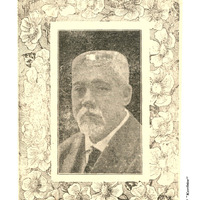 Chief Justice Araullo
Chief Justice Araullo Current Events
Current Events For the little tTots A true ghost story
For the little tTots A true ghost story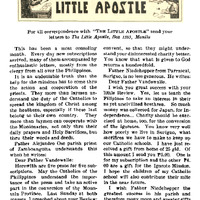 Mailbag of the Little Apostle
Mailbag of the Little Apostle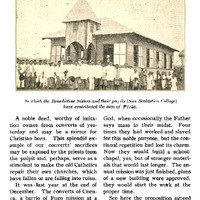 School-Chapel of Cuenca
School-Chapel of Cuenca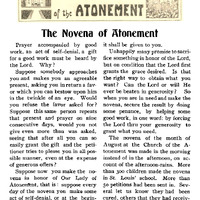 The Novena of Atonement
The Novena of Atonement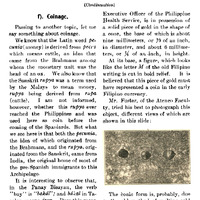 The Psychology of the Filipino (continuation)
The Psychology of the Filipino (continuation)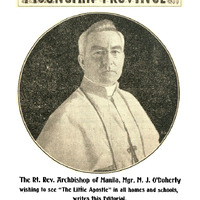 The Rt. Rev. Archbishop of Manila, Mgr. M.J. O'Doherty wishing ...
The Rt. Rev. Archbishop of Manila, Mgr. M.J. O'Doherty wishing ...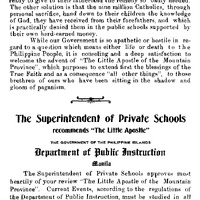 The Superintendent of Private Schools recommends the Little Apostle
The Superintendent of Private Schools recommends the Little Apostle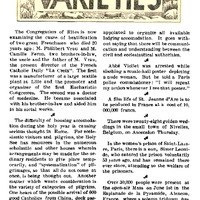 Varieties
Varieties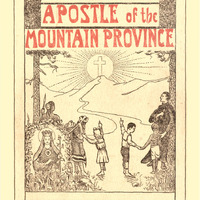 The Little Apostle of the Mountain Province
The Little Apostle of the Mountain Province